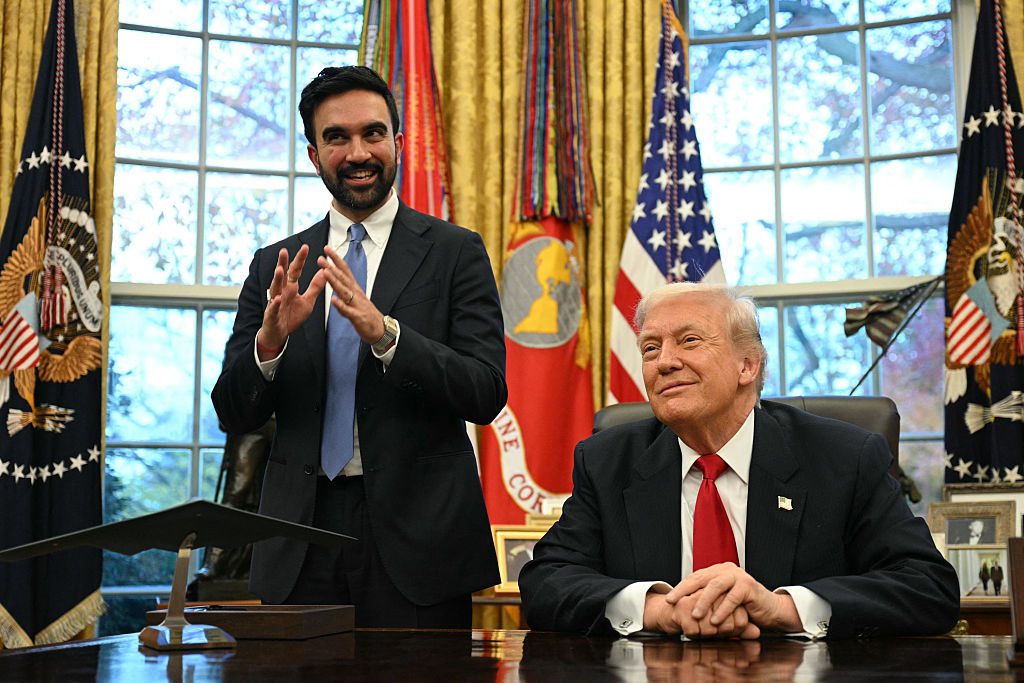Washington, D.C.
It was surreal to see Zohran Mamdani standing astride Donald Trump in the Oval Office on Friday, framed by busts of Abraham Lincoln and Benjamin Franklin. The only other time I’d spoken with Mamdani was a year earlier, through a fuzzy Zoom connection, when he was a longshot candidate in New York City’s Democratic mayoral primary. It’s exactly this story that Trump seems to love, though the chattering class may not fully realize that the President’s ample respect for Mamdani extends beyond politics.
My own question for Trump came at the end of the meeting. “Elise Stefanik has campaigned multiple times by calling Zohran Mamdani a jihadist,” I asked the President, referring to Republicans’ leading contender in the New York governor’s race. “Do you think you’re standing next to a jihadist right now in the Oval Office?”
True to form, Trump said no, adding that he “met with a very rational person” and “a man who really wants to see New York be great again.” “I think he can bring it back,” Trump replied, putting enormous confidence in a man he refers to as a “communist” and members of his party describe as “pro-Hamas.”
Both Trump and Mamdani were baited by reporters with questions about their past statements. Mamdani was pressed on his past descriptions of Trump as a “fascist.” Trump jumped in to say, “That’s ok. You can just say yes. That’s easier. It’s easier than explaining.”
Despite his politics, Mamdani’s meteoric rise obviously earned great respect from the President, who is famously fond of winners and people who come across well on television. The mayor-elect is both. At one point, Trump even mused, “Some of his ideas really are the same ideas that I have.”
That should be remembered as the most important line of the meeting. Trump’s admiration for Mamdani is not entirely superficial. Historically, populists lose without a certain degree of pragmatism, and that’s Trump and Mamdani’s most important shared quality.
This is evident in Trump’s foreign policy, as he willingly engages with foreign leaders whom other officials tend to ignore or treat as pariahs. Domestically, Democrats like Nancy Pelosi and Muriel Bowser, another blue-city mayor, have negotiated successfully with Trump by swallowing their pride and looking for deals. In Bowser’s case, it’s clearly working.
Like Mexican President Claudia Sheinbaum, who faces internal pressure to be hostile to the US, Mamdani understands that negotiating with Trump means accepting the reality that he’s president, so you can either antagonize him or try to get something out of the relationship by biting your tongue and finding common ground.
That is, of course, where this unlikely alliance could fall apart. Disagreements over immigration enforcement, for example, will likely surface soon after Mamdani takes the oath of office. Trump downplayed that on Friday, but all this could come to a dramatic end in short order. One post on social media is really all it takes, and the politics in New York City are a powder keg when it comes to Trump and Mamdani’s ideological differences.
For Mamdani, the incentive to play nice is keeping Trump’s federal crackdown on crime and immigration to a minimum. It likely won’t go away for the Big Apple, but it could certainly get worse from the left’s perspective. Managing the relationship will help him neutralize that threat.
But that incentive goes away as soon as Trump decides he no longer needs Mamdani to play nice. For now, though, the president went out on a limb with a strong prediction. “I think he is going to surprise some conservative people actually,” Trump said of Mamdani.











Join the discussion
Join like minded readers that support our journalism by becoming a paid subscriber
To join the discussion in the comments, become a paid subscriber.
Join like minded readers that support our journalism, read unlimited articles and enjoy other subscriber-only benefits.
Subscribe